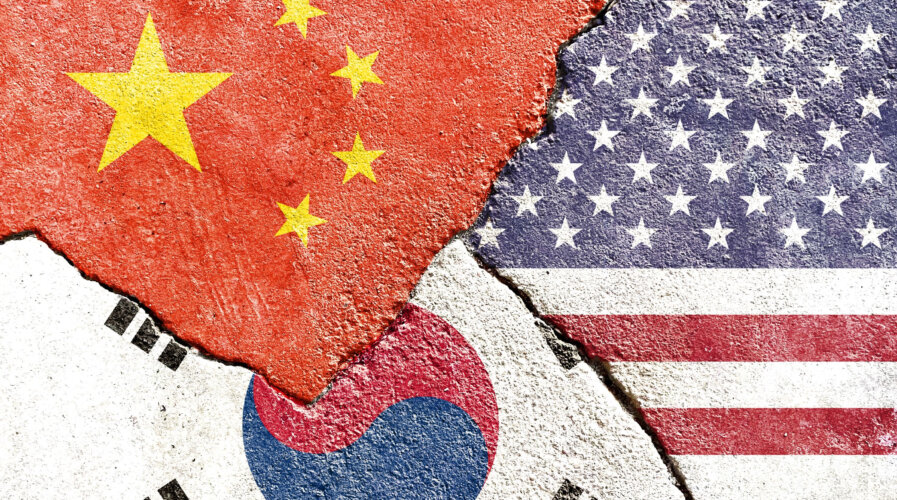
Is South Korea once again caught in between the US and China?Source: Shutterstock
Is South Korea once again caught in between the US and China?
- Unlike China, South Korea did not mention discussions between the trade chiefs about the semiconductor sector.
For most of last year, there had been talks of how South Korea–after years of walking a thin line between the US and China–is under tremendous pressure to pick a side in the growing technological rivalry between its military ally and its largest trade partner. Then when the US-led Chip 4 Alliance began taking shape earlier this year through preliminary meetings, the South Korean government’s verdict was clear.
Fast forward to last week, during the 2023 APEC Trade Ministers meeting, Chinese Commerce Minister Wang Wentao met South Korea’s Trade Minister Ahn Duk-Geun. Here’s what was interesting; China said it agreed with South Korea to strengthen dialogue and cooperation on semiconductor supply chains. However, South Korea did not mention discussions between the trade chiefs about the chip sector.
Seoul only noted that Ahn requested support from Beijing to stabilize the supply and demand of critical raw materials and parts. According to Wang, the talks, on the sidelines of the APEC trade ministers’ meeting in Detroit, also included views on maintaining the stability of the industrial supply chain and strengthening cooperation in bilateral, regional, and multilateral fields.
According to a separate statement, Ahn specifically asked Wang also to support forming a “predictable” business environment for South Korean companies operating in China.
Where is South Korea in the US-China tech war?
In February this year, the meeting between the US, South Korean, Japan, and Taiwan senior officials took place virtually, following months of coordination. For context, the Chip 4 initiative is designed to stabilize semiconductor supply chains. Besides the US, the envisioned partnership includes Japan, a leader in semiconductor-manufacturing materials; Taiwan, the top producer of cutting-edge chips; and South Korea, whose output capacity is second only to Taiwan’s.
But of course, the initiative is also seen as an attempt to freeze out China, which is racing to advance its chipmaking technology. The push has undoubtedly put South Korea, which has long focused on maintaining a balance between its economic ties with China and its security cooperation with the US, in a difficult position.
While South Korean President Yoon Suk-you considers the bilateral alliance with the US a priority and has expressed an interest in Chip 4, Beijing was also ramping up pressure on Seoul. In August, Chinese Foreign Minister Wang Yi even told South Korean counterpart Park Jin that the two countries should maintain their independence and freedom from external interference.
To put into context how prominent the Chinese market is for South Korea, China accounted for 24% of South Korea’s total trade in 2021, making it the latter’s largest trade partner. Around US$76.8 billion, or 60%, of South Korean semiconductor exports went to China that year, as did many chemicals, machinery, and other vital products. In short, China’s higher tariffs and other sanctions could blow a heavy blow to South Korea’s core industries.
For semiconductor players, it is equally detrimental. Around 20% of Samsung Electronics’ memory chips are produced in the Chinese city of Xi’an, while SK Hynix operates a plant in Wuxi and acquired Intel’s Dalian plant in 2021. It now makes 40% of its chips in China.
Before last week’s talks between Wang and Ahn, Seoul challenged Washington on its proposal to limit the expansion of production by South Korean semiconductor manufacturers in China, saying it created “an unreasonable burden” on investment. The US Commerce Department in March unveiled its proposed “national security guardrails” for the Chips Act.
The guardrails bar companies receiving federal subsidies in the US from expanding output beyond specific little caps in “foreign countries of concern” – specifically, mainland China, Russia, Iran, and North Korea.
READ MORE
- Data Strategies That Dictate Legacy Overhaul Methods for Established Banks
- Securing Data: A Guide to Navigating Australian Privacy Regulations
- Ethical Threads: Transforming Fashion with Trust and Transparency
- Top 5 Drivers Shaping IT Budgets This Financial Year
- Beyond Connectivity: How Wireless Site Surveys Enhance Tomorrow’s Business Network


